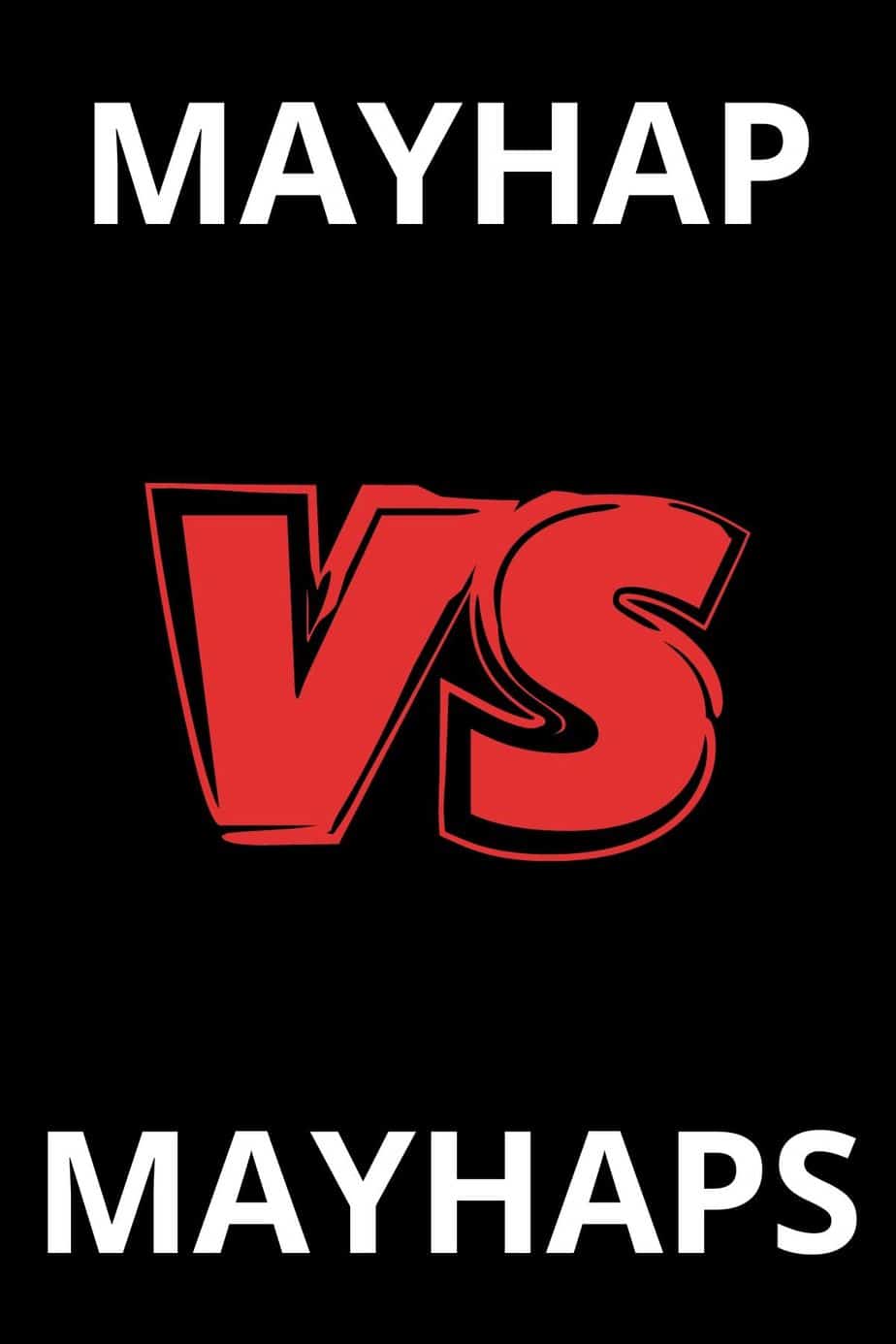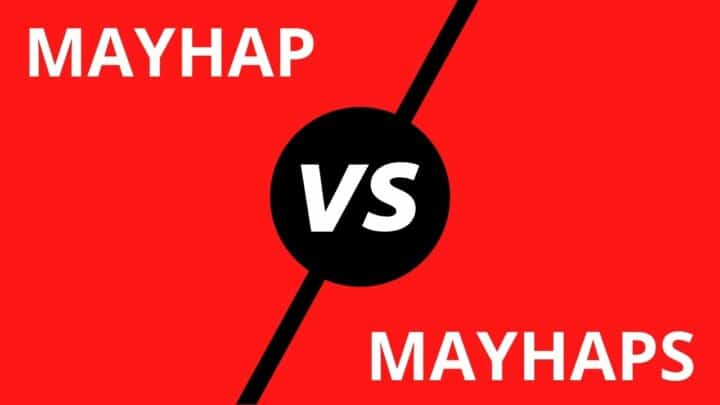“Life is full of mayhaps.” Does this quote mean life is full of “troubles,” or life is full of “maybes”?
Well, realistically speaking, it can be both because life can indeed be overflowing with nerve-racking issues as well as possibilities.
So, what do we exactly mean by “mayhaps”? Is this word simply the plural noun form of “mayhap”? Or does mean something else?
This post tackles this very issue about the English language — or should I say, the Middle English language in particular.
Let’s begin our discussion with an overview.
What is the difference between “mayhap” and “mayhaps”?
“Mayhap” and “mayhaps” are both archaic English adverbs conveniently used instead of “maybe,” “perhaps,” or “possibly.” “Mayhaps,” the combination of “maybe” and “perhaps,” has been derived from the older term “mayhap.” In terms of usage, however, “mayhap” is a more common option than “mayhaps.”
The Meaning of “Mayhap” in a nutshell
“Mayhap” is not something you would likely hear in regular conversations with your colleagues and friends because it is already considered an archaic term at present.
To understand more about how and when “mayhap” is used, the following subsections discuss its meaning, usage, as well as examples in detail.
“Maybe” is from the phrase “it may be that,” while “perhaps” is from “per” and “hap.”
With these in mind, we could deduce that “mayhap” is also a blended word.
“Mayhap” is a 16th-century English word resulting from the condensation of “it may happen” — a longer phrase also used in expressing probability.
More particularly, “mayhap” is the combination of the words “may” and “hap,” in which the latter term, also an archaic one, means “to occur by chance.”
As you may figure, “may” is a modal verb that is generally used to convey possibility, give permission, and wish for a person’s luck in declarative sentences.
To cite as an example, “may” in the adage “May the odds be in your favor” is used to superficially wish for someone’s luck.
In interrogative statements, though, the role of “may” changes into politely requesting permission, as in the question “May I leave now?”
If the degree of possibility and politeness are reduced, that is to say, the situation becomes more hypothetical, you may have to use “might” instead of “may” in your sentences.
Examples of “mayhap” in a sentence

In terms of frequency, “mayhap” is used more widely than “mayhaps” because it is basically an older term in the English lexicon.
This also means that geographically speaking, you would likely hear more people using “mayhap” in countries adhering to British English conventions than American English due to hegemonic reasons.
You would less likely hear the use of “mayhap” in ordinary spoken and written discourses because of the existence of more practical and popular options like “maybe” and “perhaps.”
Instead, you would likely observe the usage of “mayhap” discourses entailing the use of the Middle English language, such as in literary works like poems, theatrical plays, and novels.
Here are some example sentences for your reference:
Examples:
Albeit with some disadvantages, the rise and spread of English as a global language have indeed made information more accessible and communication more inclusive.
This event has also prompted scholars to painstakingly study English, as well as other existing and even dormant languages, to shed light on the series of communicative events happening across centuries.
Now that we have covered the nuances of “mayhap,” let us move on to the second word “mayhaps.”
The Meaning of “Mayhaps” in a nutshell
Similarly, you would not likely hear nor read the word “mayhaps” in your daily conversations and readings — not unless you are into the literary world.
“Mayhaps” in a nutshell is used as a convenient and informal replacement for “mayhap,” which means that you had better choose “mayhap” instead of “mayhaps” in case you need to do so.
Grounded on this premise, the following subsections also elaborate the meaning and usage of “mayhaps,” as well as some example sentences for contextualization.
Much less frequently used than “mayhap,” “mayhaps” is used as a more casual synonym for “mayhap”; the lesser frequency is due to the fact that “mayhaps” has been derived from “mayhap.”
Practically speaking, we could also say that “mayhaps” is a portmanteau or a blended expression from “maybe” and “perhaps.”
This means that the first syllable of “maybe” and the last syllable “perhaps” are conveniently combined to form a new word with a similar function.
Thus, “mayhaps” is also a word with a probabilistic role just like “maybe” and “perhaps” but with an archaic or obsolete connotation.
Words like “staycation,” “motel,” “brunch,” “netizen” and “screenager” have also undergone the morphological process of blending.
These words are generally used in informal contexts.
This also means that the reckless and indiscriminate use of “mayhaps” in writing and speaking may be subjected to criticisms from people with meticulous grammatical stances.
Examples of “mayhaps” in a sentence

The term “mayhaps” is also used as a name for a musical group with hundreds to a couple of thousand views and over a thousand subscribers on one of the most popular video-streaming platforms to date.
The rock band “The Mayhaps” was earlier referred to as “Patty PerShayla & The Mayhaps”; this band may have gotten their name from the adverb “mayhaps.”
In a nutshell, “mayhaps” is a more casual term than “mayhap,” which is still used by some people every once in a while, and hence, it is a valid English word.
But, of course, the importance of context should always be considered in using rather obsolete terms like “mayhaps.”
That is to say, using archaic terms is feasible enough if and when the target audience, as well as the communicative purpose, allows such usage.
This also means that the reckless and indiscriminate use of “mayhaps” in writing and speaking may be subjected to criticisms from people with meticulous grammatical stances.
For contextualization, here are some examples of “mayhaps” in sentences:
Examples:

Understanding adverbials of probability: The functions of “mayhap” and “mayhaps”
Words like “mayhap,” “mayhaps,” “maybe,” “perhaps,” “perchance,” “possibly,” “probably,” “likely,” “most likely” are called adverbials of probability.
Adverbials of probability are generally used to denote ideas that are likely to occur based on observations and general knowledge, such as assumptions and inferences.
In social contexts, such kinds of expressions may also be strategically used to avoid commitments, as in social invitations when we are not in the mood to do so.
For example, you could conveniently respond with “maybe” to a dinner invitation coming from a distant acquaintance that you are not comfortable dealing with.
That said, “maybe” as well as its other alternatives could be considered as the new “no” in avoiding uncomfortable social situations.
Another function of probability adverbials can be observed in the polite formulation of requests, commands, and recommendations in professional settings.
The statement “You should maybe do this” and “Perhaps you could try another way” could be used to politely suggest possible solutions during interprofessional interactions.
These kinds of statements are necessary for preventing misconceptions of being pretentious or condescending in business-related contexts.
Moreover, when you are asked to predict an outcome of a plan, for instance, you can strategically use adverbs of probability to make arguable statements rather than unfalsifiable ones.
In a nutshell, using expressions with probabilistic connotations could protect the self from false assumptions and, hence, a tool for conflict avoidance.
Frequently Asked Questions on “Mayhap” vs. “Mayhaps”
Does “mayhaps” mean “perhaps” or “mishaps”?
“Mayhaps” is the convenient combination of “maybe” and “perhaps,” which means “perhaps” rather than “mishaps.” It is generally used as a convenient replacement for “mayhap.”
Is “mayhaps” a valid English word?
“Mayhaps” is a valid yet obsolete English word used to conveniently say “maybe” and “perhaps” at the same time. It comes from the similarly archaic term “mayhap,” which is the condensed version of “it may happen.”
Conclusion
“Mayhap” and “mayhaps” are two words that not most people would understand upon the utterance; hence, these two words may likely cause misinterpretation in actual communicative situations.
To avoid miscommunication, we simply need to limit the use of “mayhap” and “mayhaps” in contexts that would especially justify such usage of linguistic irregularities.

Hey fellow Linguaholics! It’s me, Marcel. I am the proud owner of linguaholic.com. Languages have always been my passion and I have studied Linguistics, Computational Linguistics and Sinology at the University of Zurich. It is my utmost pleasure to share with all of you guys what I know about languages and linguistics in general.

